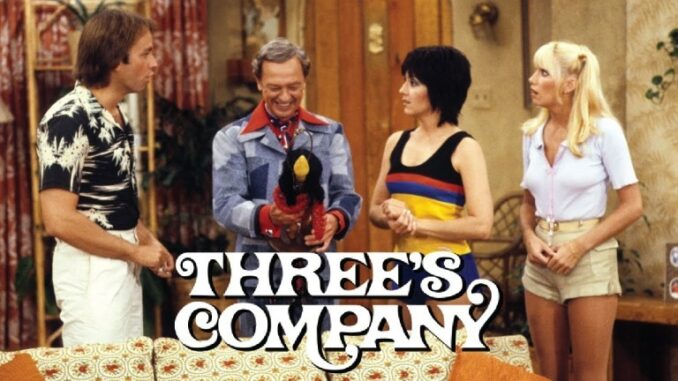

“Come and knock on our door. We’ve been waiting for you. Where the kisses are hers and hers and his, three’s company too.“
Could there be a more swingin’ 1970s TV theme song? Come on, you know the words. We all do.
So while on holiday recently I was feeling a bit under the weather and, as you do, one evening I ended up watching four or five episodes in a row of ‘70s-‘80s camp sitcom Three’s Company in a row.
It was the first time in years I’d watched the show, but I admit that like most kids growing up in the ‘80s, I watched Three’s Company all the time. We watched everything, from classics like M*A*S*H and The Brady Bunch to also-rans like What’s Happening! and Manimal. That’s what we did in the olden days, before the eruption of a sprawling multiverse of entertainment options 24-7, when you simply watched ‘whatever was on’.
Watching a slew of Three’s Company in my vaguely sick bed recently was bizarre – I have trouble remembering what I ate for lunch yesterday, but as these goofy sitcoms unfolded I nodded in recognition – ah yes, here’s the one where they went to the farm; here’s the one where Jack makes a mob boss linguini. How the hell do I remember a sitcom episode I last watched in 1983? The insanity of childhood sitcoms, the quintessential comfort food, imprinted itself on my brain.
The 1977-1984 run of Three’s Company seems a strange relic now, nearly 50 years (!!) since it debuted, a broad bawdy farce perched between the groovy ‘70s and a more uptight ‘80s Reaganland. The premise is pretty much the definition of problematic by modern standards – hep cat Jack Tripper (the late, great John Ritter) pretends to be gay so he can live in an affordable apartment with two attractive young single women (Suzanne Somers and Joyce DeWitt) without offending their prudish landlord Mr Roper (Norman Fell). Hijinks ensue, somehow for eight entire seasons!

Loose-limbed and amiable Ritter was a national treasure, of course, and like John Cleese in Fawlty Towers, he carries the show on his shoulders. The women of Three’s Company fared less well; I know we were all supposed to like the late Suzanne Somers but I found her blonde ditz irritating and Joyce DeWitt’s Janet was often just a straight woman. I rather liked Priscilla Barnes’ Terri, who replaced Somers in the later years and seemed a bit more sly and unpredictable.
The central homophobia that drives Three’s Company is incredibly dated, but the show, mostly, was lewd and campy rather than hateful, even though there’s plenty of cringe-worthy farce humour revolving around gay misunderstandings and affairs.
Unfortunately, a lot of the ‘humour’ relies on the premise that the worst possible thing would be for Jack to be gay.
I grew up in a world where “fag” was the number one insult of choice by and for teenage boys. I got called one an awful lot for a few years and I’m ashamed to admit I probably called other kids it too a few times. It was stupid.

Jack’s homophobic landlords, despite usually being the butt of the joke for their overwrought gay panic, do leave a bit of a sour aftertaste. Even watching the show as a kid, Stanley Roper and Mr Furley’s limp-wristed gay-bashing jibes seemed forced and unfunny to me. Norman Fell’s oily Mr Roper always struck me as a little too nasty and sinister. You felt he meant it. Knotts’ goofy Furley, on the other hand, definitely felt like a closet case, and the show eased off a lot on the gay panic as it ambled along. The series ended with Jack Tripper, of course, marrying off to a nice girl.
Did gay characters ever appear on Three’s Company as more than a punchline? I don’t have enough of an encyclopaedic memory to recall if they did, but the show was far more about the idea of being gay as some strange unknown rather than any kind of cultural exploration of what that meant in 1978.
While there are a lot of things about the modern world that are pretty terrible and backwards still, the gentle wave of gay acceptance just during my adult life makes me feel a glimmer of optimism sometimes. A good half-dozen or so of the friends I grew up with in high school later came out as gay, and I was overjoyed to see how happy and complete they seemed. I can’t imagine what it must have been like trying to keep that quiet in the ‘80s, which feels now the last real gasp of generally accepted wider cultural homophobia.
Still, there are plenty of people out there who still see nothing wrong with calling someone a “fag.” It’s nowhere near good enough today, of course, and a lot of people want to roll the clock back or worse.
Three’s Company was a flimsy, unsubtle and silly show that didn’t intend to change the world like so much of today’s “prestige, event TV” – honestly, spending 800 words or so going on about it seems wildly overegging it – but at the same time, gazing back from what seems the impossibly futuristic date of 2024, it kind of shows how the world has changed, slowly, ever since Jack Tripper first knocked on that door.
